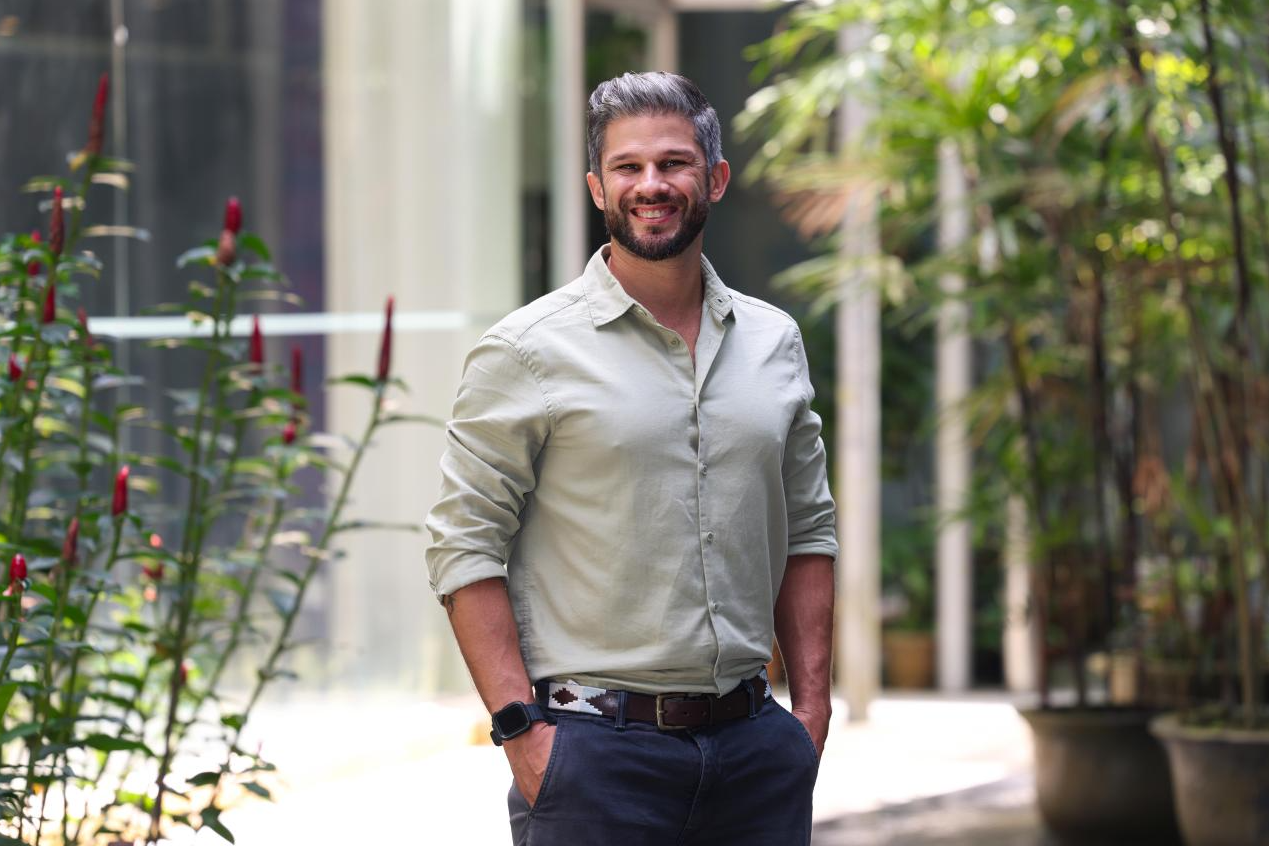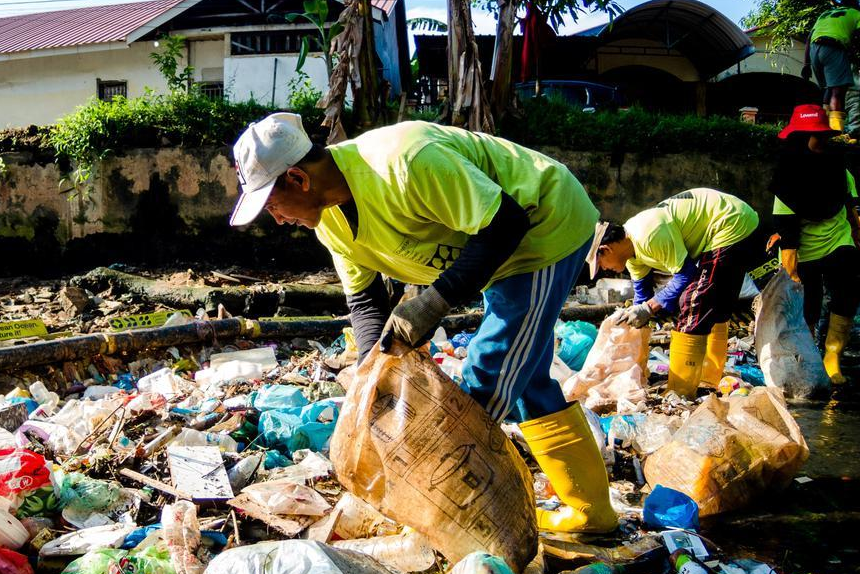September 27, 2024
The Business Times – Saving the seas by spearheading solid sustainability
Read the original story on The Business Times.
Social enterprise Seven Clean Seas hopes its pioneering of plastic credits will be the key to funding ocean cleanups.

Thomas Peacock-Nazil, chief executive of Seven Clean Seas, has helped establish the first certified plastic credits. PHOTO: YEN MENG JIIN, BT
THE first evening Thomas Peacock-Nazil and his wife Pamela Correia spent on the island of Koh Lipe in Thailand, they enjoyed a stunning sunset framed by turquoise waters and a pristine beach.
After a stormy night, however, they were greeted the next morning by the sight of plastic swept onto the sand by the wind and tides.
That experience sparked a mission: Upon their return to Singapore, the couple began organising beach cleanups. The same year, 2018, they founded Seven Clean Seas (SCS) with their friend Ben Moody.
“We’re on a mission to become the world’s biggest preventer of ocean plastic by building projects that prevent, intercept and collect plastic from the marine environment.”
– Thomas Peacock-Nazil, chief executive of Seven Clean Seas
Even as SCS was removing tonnes of plastic from Singapore’s beaches, the three founders realised that plastic pollution was an international problem that could only be addressed with more effort – and much more capital.
In 2019, their mission received fuel in the form of a call from a socially minded corporation.
Einhorn Condoms, a Berlin-based producer of fair-trade and sustainable healthcare products, was looking for a sustainable way to process or offset six tonnes of plastic production waste.
“I’m familiar with the carbon credit market, and what they were talking about was a plastic credit market,” said Peacock-Nazil, who used to be a financial adviser.
“I did a lot of research and there wasn’t a single mention of a ‘plastic credit’,” he said. “That’s when I thought: There is a model here.”
Credits to society

Plastic credits can help fund marine cleanup and recycling initiatives, and prevent plastic waste going straight to landfill. PHOTO: SEVEN CLEAN SEAS
Just as carbon credits give allowances to companies to generate emissions, plastic credits give companies allowances to generate plastic waste.
Money generated from the sale of these credits to corporations is then used to fund ocean cleanups.
The generation and sale of SCS’ plastic credits are certified by the standards organisations Verra and Zero Plastic Oceans, and audited by Control Union.
To date, SCS has generated 4,000 plastic credits through the collection of four million kg of ocean plastic.
Sales data is confidential, but notable purchasers include Fifa World Cup Qatar, which bought 400 credits; and insurance brokerage Howden Group, which bought 500.
This pioneering approach to raising funds for cleaning oceans was instrumental in allowing the company to clinch the Impact Enterprise Excellence Award for small and medium-sized enterprises at the 2024 Sustainability Impact Awards jointly organised by The Business Times and UOB.
SCS also receives donations in cash – a solar-powered river cleanup vessel in Thailand was funded in this way – but a large proportion of its operating expenses is now covered by the sale of credits.
“Our whole modus operandi is to build projects that have financial sustainability and formally employ all of the staff that work in those projects,” said Peacock-Nazil.
SCS currently has operations in Batam, Bintan and River Bengkong in Indonesia; and the Chao Phraya River in Thailand.
It employs locals and prides itself on fair compensation that includes meeting local wage standards as well as offering five-day working weeks, holidays and paid leave.
While this may seem like the bare minimum, Peacock-Nazil noted that the region’s waste management sector is predominantly informal and often rife with bad practices such as the use of child labour.
Coast to coast, sea to sea
Now that SCS has pioneered the plastic credit system, Peacock-Nazil hopes it will be copied by other organisations.
“There’s an enormous gap in waste management. Let’s try and fill that gap with funding through generating plastic credits that are sold globally,” he said.
SCS aims to remove 10,000 tonnes of plastic from the region’s seas by 2025, but that is a literal drop in an ocean of plastic pollution. It is estimated that eight to 10 million tonnes of plastic waste enter the ocean every year.
“There’s no scenario in which SCS can fix ocean plastic pollution on our own. What we’re doing is showing that there is a business model. Whether you’re in Ghana or the Philippines or Brazil, you can look at (our) business model,” said Peacock-Nazil.
“(Our model) is to formally employ staff, clean up the ocean, sell credits on an international market and make revenue to allow you to operate almost like a traditional for-profit business. ‘Profits’ is not a dirty word in sustainability. When I hear that, I hear ‘financial sustainability’,” he said.
The next step, he added, is to improve the rate of plastic recycling. When SCS first started operations in Bintan, large proportions of the collected plastic had to go into landfills because there was no way to recycle the materials properly.
In 2021, contributions from the Ecca Family Foundation and Indo-Suez allowed SCS to establish processes to handle recycling.
Proper recycling and circularity solutions will cost hundreds of thousands of dollars, said Peacock-Nazil. Once implemented, however, they could allow for a recycling rate of up to 70 per cent for plastics, compared with a conventional rate of just 9 per cent.
Waste that is removed from the environment can be recycled into new products such as building materials.
Such efforts have to go hand in hand with reducing the use of plastic, Peacock-Nazil added, because sometimes plastic is necessary.
“There are organisations around the world that are really sad that they have to use single-use plastic in their products,” he said. “For technical or regulatory reasons they have to do it, because it is a super material in so many instances.”
